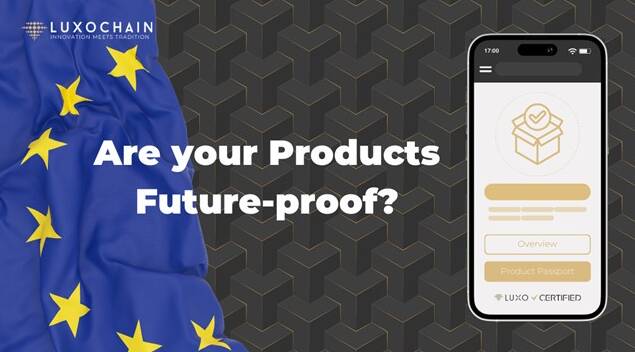Digital Product Passport: A Key Step for Businesses Before 2026

For more insights on corporate transparency, follow us to stay updated. We bridge the gap between innovation and tradition, fostering loyalty every step of the way 👉 Luxochain
The constant evolution of the digital world and growing consumer demands for more transparency and sustainability have led to the creation of a transformative tool: the Digital Product Passport (DPP). This innovative system is changing industries, helping businesses reach higher levels of accountability and stand out in competitive markets.
What is the Digital Product Passport?
The Digital Product Passport is a complete digital platform that collects and stores all important details about a product during its entire lifecycle. From sourcing raw materials to recycling at the end of its use, this system ensures every step is securely recorded. The DPP provides key information such as the origins of materials, manufacturing processes, sustainability certifications, and recycling methods. It also confirms ownership and authenticity, offering businesses and consumers a trustworthy and transparent resource.
Blockchain: The Foundation of Transparency
Blockchain technology is the core of the DPP. Known for its decentralized and secure structure, blockchain guarantees that the information stored is accurate, transparent, and easy to access. Every entry in the blockchain is permanent, creating a reliable system where data can be checked at any moment. This is particularly important in industries like luxury, fashion, and healthcare, where ethical practices and authenticity are highly valued. For example, in healthcare, blockchain helps maintain the integrity of medical supply chains and protects patient information. By securing each transaction and update, blockchain builds a new level of trust for consumers and stakeholders.
How Does the DPP Work?
The DPP uses advanced tools to make sure it works effectively. Blockchain creates a shared ledger that saves every change permanently. Smart labels, like QR codes, NFC tags, and RFID chips, connect physical products to their digital profiles. This makes it easy for manufacturers, retailers, and consumers to check product information with just a smartphone, linking the digital and physical worlds seamlessly.
The EU’s Push for Regulation
The European Union, through its Green Deal and Circular Economy Action Plan, has introduced policies that will make the DPP mandatory by 2026. These policies aim to boost corporate responsibility, lower environmental impacts, and improve supply chain transparency.
For companies, following these regulations is not only about legal compliance but also about gaining strategic benefits. Businesses that adopt the DPP showcase leadership in sustainability and governance, making them attractive to investors and consumers who value ESG (Environmental, Social, and Governance) principles.
Benefits of the DPP for Businesses
The DPP changes how businesses handle product information and connect with customers. By digitizing data, companies can simplify operations, minimize errors, and strengthen their brand reputation through secure digital certifications. These certifications prove authenticity and ownership, improving customer trust and loyalty.
Additionally, the DPP enables new opportunities, like blockchain-based loyalty programs. These programs reward customer engagement, building stronger relationships and encouraging long-term loyalty.
Another important benefit is reducing the risk of counterfeiting. With the DPP, consumers can easily verify a product’s authenticity and quality, solving a major issue for many industries.
Empowering Consumers with Transparency
For consumers, the DPP offers the ability to make informed decisions. Detailed information about a product’s sustainability, material sources, and production processes allows buyers to match their purchases with their values.
The DPP also provides digital ownership records, which is particularly useful for high-value products like electronics or luxury goods. This feature gives consumers proof of authenticity and ownership, protecting their purchases.
Real-World Use Cases
The versatility of the DPP makes it useful in many sectors. In fashion, it supports accountability in supply chains. In electronics, it helps track components for recycling to reduce electronic waste. In the food industry, it verifies the sources of ingredients and ensures compliance with safety standards.
These examples show that the DPP is more than a technological improvement—it is a driving force for industry change and systemic transformation.
Toward a Transparent and Sustainable Future
The Digital Product Passport reflects values like transparency, sustainability, and innovation. It gives businesses the tools to adapt to new regulations and helps consumers make ethical choices.
As 2026 approaches, companies that adopt the DPP will not only meet regulatory requirements but also gain a competitive edge. With a clear strategy and the right technological partners, businesses can turn this challenge into a chance to lead their markets.
For those ready to take this step, the Digital Product Passport is a foundation for a responsible and sustainable future. Discover how innovation and tradition come together to build lasting trust by visiting Luxochain’s official channels.
For more insights on corporate transparency, follow us to stay updated. We bridge the gap between innovation and tradition, fostering loyalty every step of the way 👉 Luxochain
Visit our official channels to explore how our solutions can transform your business and lead you toward a sustainable future 👇
